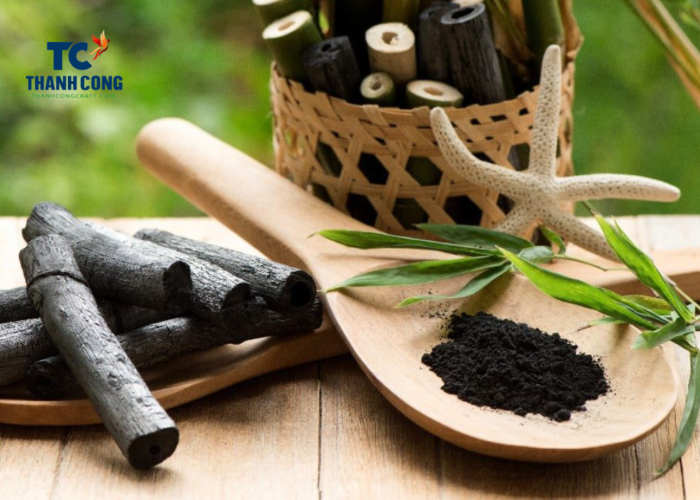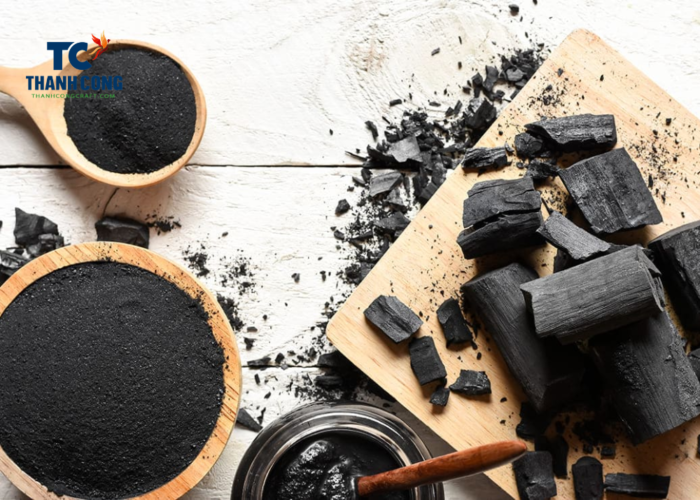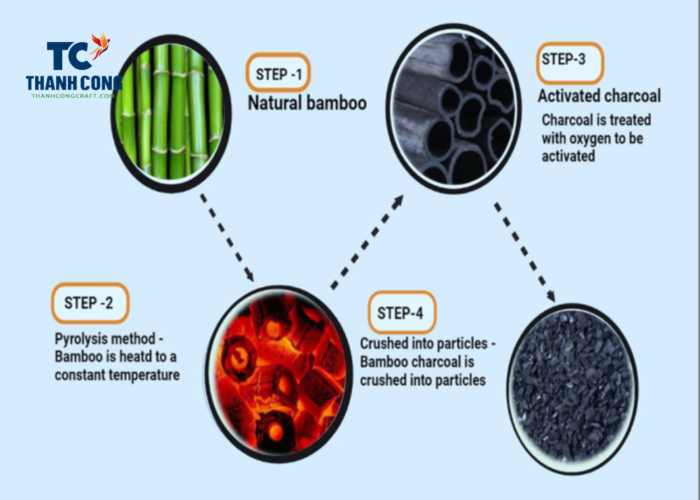Activated charcoal is a type of charcoal that has the ability to absorb organic and inorganic substances, helping to remove impurities, odors and toxins in the air, water and soil. Did you know that you can make activated charcoal from bamboo at home? In this article, we will guide you how to make bamboo activated charcoal at home in a simple and safe way.
1. Bamboo charcoal uses?
Bamboo charcoal is a type of activated carbon produced from bamboo. It has many applications in life such as filtering, deodorizing, absorbing moisture, improving soil and water, beautifying and caring for health. Some ways to use bamboo charcoal are as follows:
- As a filter: Bamboo charcoal has the ability to filter impurities, heavy metals and bacteria in drinking water, bath water and air. You can use small bags containing bamboo charcoal to place in water bottles, bathtubs or bedrooms to create a clean and safe environment.

- Deodorize: Bamboo charcoal also has the effect of absorbing odors, smoke and other smells in the house. You can place bamboo charcoal bags in closets, shoes, cars or trash cans to prevent odors from arising.
- Absorb moisture: Bamboo charcoal also has the ability to regulate humidity in the living space. It can absorb moisture when it is humid and release moisture when it is dry. This helps prevent the growth of mold, bacteria and insects that harm health.
- Improve soil and water: Bamboo charcoal is also useful for agriculture and aquaculture. It can improve soil quality by providing minerals and beneficial microorganisms. It can also reduce acidity
- Facial Masks and Cleansers: Bamboo charcoal is incorporated into skincare products such as facial masks and cleansers. Its absorbent properties make it effective in drawing out toxins and impurities from the skin, promoting a clearer complexion.

- Cooking and Drinking: In some cultures, bamboo charcoal powder is used in culinary applications. It may be added to food and drinks for its potential health benefits, including detoxification and alkalizing properties.
- Soil Amendment: Bamboo charcoal can be used as a soil amendment to improve soil fertility and structure. Its porous nature helps retain water and nutrients, creating a healthier environment for plant growth.
- Building Materials: In some instances, bamboo charcoal has been integrated into building materials for its insulation properties and potential to regulate humidity levels.
2. How to make bamboo activated charcoal?
Bamboo activated charcoal is a type of activated carbon that is produced from bamboo, a soft-stemmed plant that has many applications in life. Bamboo activated charcoal has many properties such as the ability to absorb toxins, deodorize, regulate humidity and improve air quality.
To make bamboo activated charcoal, you need the following steps:

Step 1
Choose fresh, clean and mold-free bamboo. You can use any type of bamboo, but you should choose the ones with a diameter of about 5-10 cm for easy handling.
Step 2
Cut the bamboo into small pieces, about 10-15 cm in length. You can use a knife, scissors or saw to cut the bamboo.
Step 3
Burn the bamboo in a large oven or pot, with a tight lid. You should burn the bamboo at a high temperature, about 800-1000 degrees C, for 2-4 hours. During the burning process, you have to keep the air from entering the oven or pot to prevent the bamboo from turning into ash.
Step 4
After burning, you will get black, hard and hollow pieces of bamboo. This is bamboo activated charcoal. You should let the bamboo activated charcoal cool completely before using or storing it.
3. FAQs
3.1 Does bamboo charcoal need to be activated? How do you activate bamboo charcoal?
Yes, bamboo charcoal can be activated to enhance its adsorption capabilities. Activation involves exposing the charcoal to high temperatures or chemicals, creating pores that increase its surface area and effectiveness in trapping impurities.
Common methods include physical activation using heat or steam, and chemical activation with substances like phosphoric acid. After activation, the charcoal is cooled, washed to remove residual agents, and then dried before use. Activated bamboo charcoal is widely used in air and water purification due to its improved adsorption properties
3.2 How long does activated bamboo charcoal last?
The longevity of activated bamboo charcoal depends on various factors, including usage and environmental conditions. In general, activated bamboo charcoal can be effective for several weeks to a few months.
However, its adsorption capacity may diminish over time as it reaches saturation with trapped impurities. To prolong its effectiveness, regular reactivation or replacement is recommended. Reactivation involves placing the charcoal in direct sunlight or a low-temperature oven for a specified period to release trapped particles and restore its adsorption capabilities.
Proper care and maintenance can extend the lifespan of activated bamboo charcoal.
3.3 Is activated bamboo charcoal better than regular charcoal?
Activated bamboo charcoal is often considered more effective than regular charcoal for certain purposes due to its enhanced adsorption capabilities. The activation process creates a network of pores in the charcoal, significantly increasing its surface area. This makes it more efficient at trapping and adsorbing impurities, odors, and pollutants.
Regular charcoal, while still possessing some adsorptive properties, doesn’t undergo the activation process and thus has fewer open pores. As a result, activated bamboo charcoal is preferred in applications like air and water purification, where a higher adsorption capacity is desirable.
3.4 What are the disadvantages of bamboo charcoal?
While bamboo charcoal offers numerous benefits, it comes with certain disadvantages. These include a limited lifespan, potential messy residue, inconsistent quality among products, a relatively slow adsorption rate, environmental considerations in production, varying effectiveness against different contaminants, and limited application in cooking.
Careful consideration of these factors is essential for maximizing the advantages of bamboo charcoal while addressing its limitations.
If you have any further questions, don’t hesitate to send thanhcongcraft an email us at [email protected] or message us at WhatsApp: +84967485411. Hope to serve you soon! Best regard!


